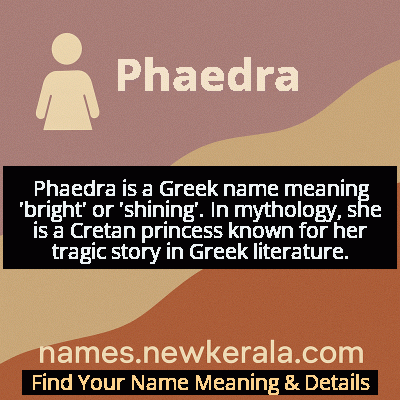Phaedra Name Meaning & Details
Origin, Popularity, Numerology Analysis & Name Meaning of Phaedra
Discover the origin, meaning, and cultural significance of the name PHAEDRA. Delve into its historical roots and explore the lasting impact it has had on communities and traditions.
Name
Phaedra
Gender
Female
Origin
Greek
Lucky Number
8
Meaning of the Name - Phaedra
Phaedra is a Greek name meaning 'bright' or 'shining'. In mythology, she is a Cretan princess known for her tragic story in Greek literature.
Phaedra - Complete Numerology Analysis
Your Numerology Number
Based on Pythagorean Numerology System
Ruling Planet
Saturn
Positive Nature
Ambitious, efficient, realistic, and authoritative.
Negative Traits
Materialistic, stressed, confrontational, and can be overly ambitious.
Lucky Colours
Dark blue, black.
Lucky Days
Saturday.
Lucky Stones
Blue sapphire, amethyst.
Harmony Numbers
2, 4, 6.
Best Suited Professions
Business leaders, managers, financial services, law enforcement.
What People Like About You
Leadership, determination, organizational skills.
Famous People Named Phaedra
Phaedra Parks
Reality Television Star and Attorney
Known for her role on 'The Real Housewives of Atlanta' and successful entertainment law career
Phaedra Mitchell
Chef and Restaurateur
Award-winning chef and owner of The Greedy Cow restaurant in the UK
Phaedra (character)
Literary Character
Central tragic figure in Euripides' play 'Hippolytus' and subsequent adaptations
Name Variations & International Equivalents
Click on blue names to explore their detailed meanings. Gray names with will be available soon.
Cultural & Historical Significance
The character's enduring appeal lies in her psychological complexity—she is neither purely villain nor victim, but a multidimensional figure struggling with forces beyond her control. Throughout Western cultural history, Phaedra has been reinterpreted by major literary figures including Seneca in Roman times, Racine in 17th-century France, and numerous modern playwrights and filmmakers. Each adaptation reflects contemporary attitudes toward female sexuality, mental health, and social constraints, making Phaedra a timeless mirror of society's evolving understanding of human nature and moral complexity.
Extended Personality Analysis
Individuals bearing the name Phaedra often exhibit a fascinating combination of intensity and refinement that sets them apart. Drawing from their mythological namesake, they typically possess deep emotional reservoirs, intellectual sophistication, and a compelling presence that commands attention. Modern Phaedras are frequently characterized by their artistic sensibilities, eloquent communication skills, and tendency toward profound self-reflection. They navigate the world with a regal dignity that often masks complex inner emotional landscapes.
These individuals usually demonstrate strong convictions and passionate engagement with their interests, whether artistic, intellectual, or personal. While capable of great loyalty and depth in relationships, they may also experience significant internal conflicts between their ideals and realities. The name suggests someone who feels emotions intensely but maintains outward composure, creating an intriguing contrast between surface calm and deep emotional currents. This combination of strength and vulnerability, intelligence and passion, makes Phaedras memorable individuals who leave lasting impressions on those they encounter.
Modern Usage & Popularity
In contemporary naming practices, Phaedra maintains a distinctive presence as an elegant, literary choice that appeals to parents seeking classical names with dramatic resonance and mythological depth. While never achieving mainstream popularity, it enjoys steady usage among educated, culturally aware families, particularly in academic, artistic, and literary circles. The name experienced modest revitalization in the late 20th and early 21st centuries, likely influenced by increased interest in mythological names and appearances in popular media. In the United States, Phaedra has consistently remained outside the top 1000 names, preserving its exclusive appeal and preventing overuse. Its usage is more established in European countries with strong classical traditions, especially Greece, where it maintains cultural continuity while offering a sophisticated alternative to more common mythological names. The name's rarity ensures that bearers stand out while carrying a rich cultural heritage.
Symbolic & Spiritual Meanings
Symbolically, Phaedra represents the profound tension between societal constraints and authentic desire, between civilized behavior and primal emotion. The name embodies the tragic beauty of impossible love and the destructive potential of repressed feelings. Derived from the Greek word meaning 'bright' or 'radiant,' Phaedra symbolizes both intellectual illumination and the painful clarity that accompanies emotional truth. In psychological terms, she represents the shadow self—those aspects of personality that society demands we suppress, but which inevitably emerge with dramatic consequences.
Metaphorically, Phaedra signifies the eternal human struggle between individual passion and social morality, between personal truth and public expectation. Her story serves as a cautionary tale about the dangers of denial and the cost of living authentically within restrictive social structures. The name also carries connotations of royal dignity undermined by human vulnerability, suggesting that even those in positions of power and privilege are subject to the same emotional complexities as ordinary individuals. This rich symbolic tapestry makes Phaedra a name that speaks to fundamental human experiences across time and culture.

